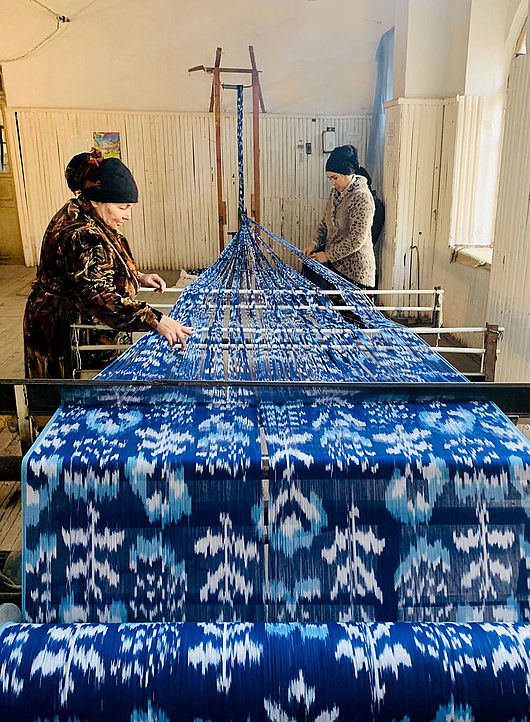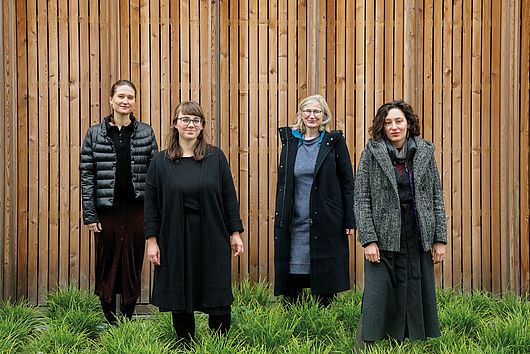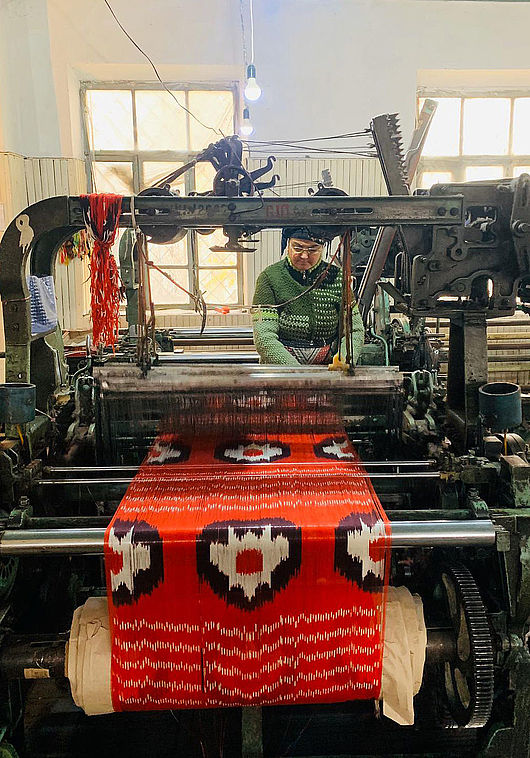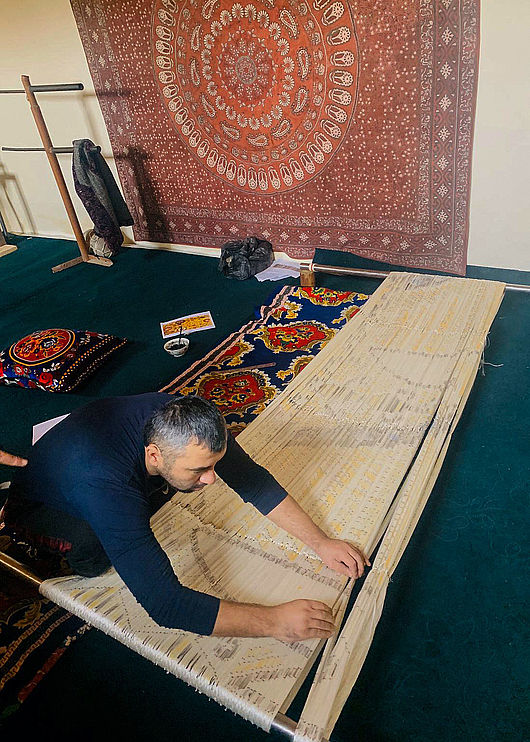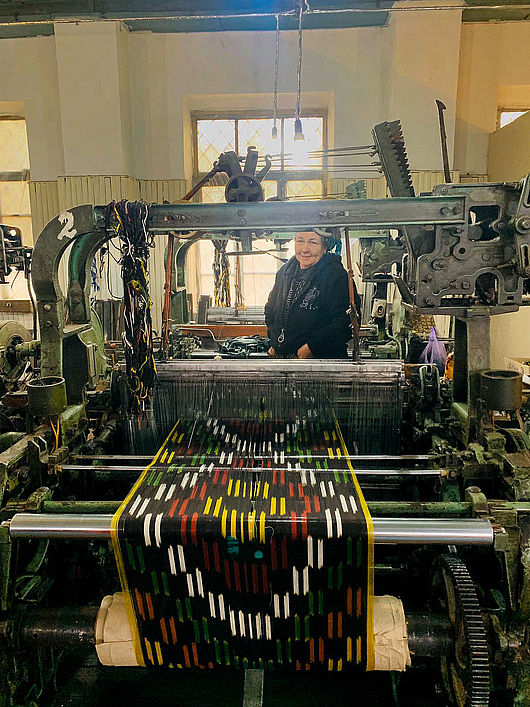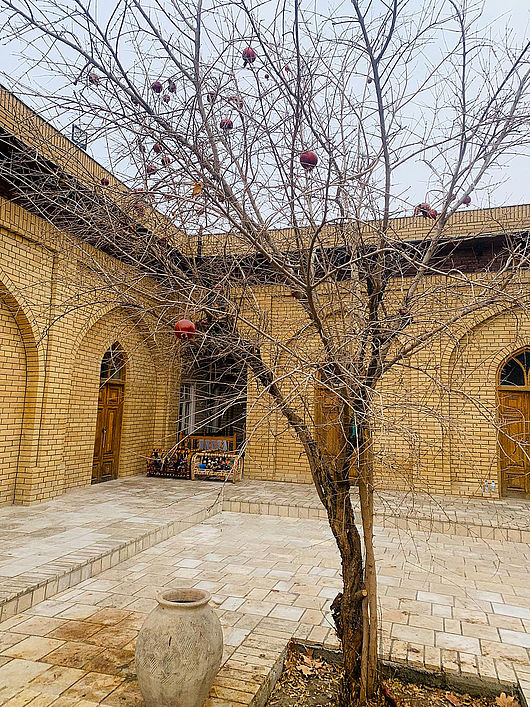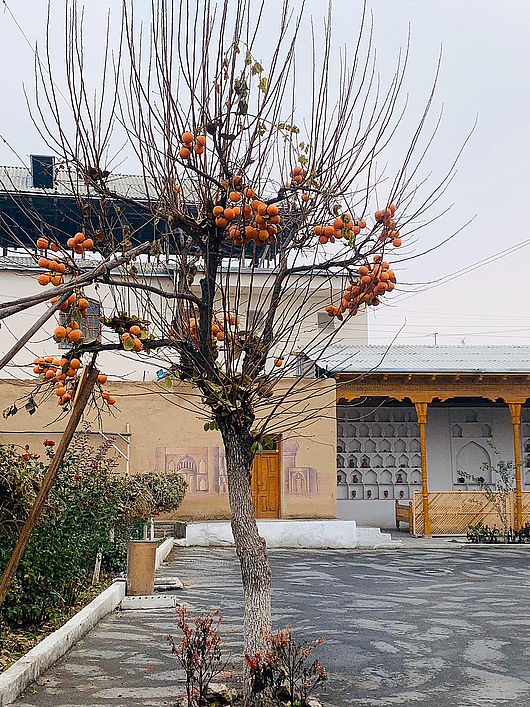Team des Forschungsprojekts RUTSIS, vrnl: Laura Linsig, Kristin Nebauer, Prof. Bettina Göttke-Krogmann, Johanna Rogalla, EU-SWITCH Projekt RUTSIS
Ikat today: EU research project on sustainable textile production in Central Asia starts at the BURG
The RUTSIS project aims to refine the traditional textile production of Uzbekistan and Tajikistan.
Vorbereitung einer Ikatkette, Yodgorlik Silk factory in Margilan, Usbekistan. Foto: Nadja Zdravkova, EU-SWITCH Projekt RUTSIS
The research project RUTSIS - Reviving Uzbekistan's and Tajikistan's Sustainable Ikat and Silk Production has been startet at the Burg Giebichenstein University of Art and Design Halle at the beginning of the semester 2020. The aim of the project, which is anchored in the field of study of textile design, is the revival and further development of Silk and Ikat production in Central Asia. With the focus on quality and social and ecological sustainability, the local silk production is to be promoted locally with the help of RUTSIS. In addition, sustainable guidelines for the production of Ikat textiles will be developed and results will be integrated into the training and further education of producers in the form of teaching materials. The project, which is scheduled to run for three years, is funded by SWITCH ASIA, a European Union program for development cooperation with cooperation partners in Uzbekistan, Tajikistan and Germany.
Since October 2020, Johanna Rogalla, Laura Linsig and Kristin Nebauer, who are employed specifically for the project, are researching regional dyeing recipes, writing teaching materials and developing teaching concepts under the project management of textile design professor Bettina Göttke-Krogmann. Beyond the protection of regional textile production, the textile heritage is to be brought into a contemporary context and made accessible through design. For this purpose, an exchange between designers and BURG students is planned in cooperation with the Crafts Development Center Margilan in Uzbekistan and the Tourism Development Center in Tajikistan, which is to increase the visibility of regional Ikats through the joint development of a textile collection. In addition, a digital archive with a focus on Central Asian Ikat will be created, later serving as a research and working tool for scientists, designers, craftsmen- and women and collections worldwide.
The research project, which is based at the BURG and the partner regions and coordinated by the Berlin consultancy adelphi, aims to promote the exchange of textile goods and cultural knowledge in the regions. In addition, medium-sized, small and micro enterprises are to be supported in the further development of their products in aspects such as dyeing, resource conservation and quality control. The results of the BURG’s research project Organic Prints from 2019, will be incorporated into the collaboration with the cooperation partners, in which guidelines for environmentally friendly dyeing with natural dyes and the sustainable use and regional sourcing of production resources will be developed.
About the culture of Ikat production in Tajikistan and Uzbekistan
The term Ikat refers to textiles that obtain their characteristic pattern by setting and dyeing the yarn before weaving. These fabrics and the traditions of silk production and processing have had a lasting influence on the textile culture of Central Asia and make Uzbekistan and Tajikistan an integral part of the Great Silk Road. To this day, Ikats are the trademark of many contemporary local designers and fashion brands, although they were separated from the western markets for a long time. Today, interest in the unique high-quality designs of Ikat is increasing internationally. However, with the dissolution of the Soviet Union and the civil war in Tajikistan, much of the knowledge about sericulture and the traditional production methods of ikat textiles was lost. In the meantime, these have been replaced in many regions by, for example, industrial dyeing methods, which contribute to the pollution of the environment and water resources. The project aims to contribute to reviving buried knowledge and putting it into a contemporary context.
Project participants and sponsors
The project is managed by adelphi research gGmbH and is part of the SWITCH-Asia - EU funding program. Cooperation partners are the Chamber of Industry and Commerce of the Republic of Tajikistan, the Crafts Development Center Margilan, the Chamber of Industry and Commerce of the Republic of Uzbekistan and the textile design department of the Burg Giebichenstein University of Art and Design Halle.
Ikatproduktion auf Industrie-Webstühlen in der Yodgorlik Silk factory in Margilan, Usbekistan. Foto: Nadja Zdravkova, EU-SWITCH Projekt RUTSIS
Ikatmalermeister bei der Vorbereitung einer Seidenkette im Crafts Development Center Margilan. Foto: Nadja Zdravkova, EU-SWITCH Projekt RUTSIS
Ikatproduktion auf Industrie-Webstüh-len in der Yodgorlik Silk factory in Margilan, Usbekistan. Foto: Nadja Zdravkova, EU-SWITCH Projekt RUTSIS
Hof des Crafts Development Center Margilan, Usbekistan. Foto: Nadja Zdravkova, EU-SWITCH Projekt RUTSIS
Yodgorlik Silk factory in Margilan, Usbekistan. Foto: Nadja Zdravkova, EU-SWITCH Projekt RUTSIS
Downloads
- Pressemitteilung (PDF)
- Press Release (PDF)
- Abbildung: Vorbereitung Ikatkette, Yodgorlik Silk factory in Margilan, Usbekistan. Foto: Nadja Zdravkova, EU-SWITCH Projekt RUTSIS
- Abbildung: Ikatproduktion, Yodgorlik Silk factory in Margilan, Usbekistan. Foto: Nadja Zdravkova, EU-SWITCH Projekt RUTSIS
- Abbildung: Projektteam RUTSIS, vlnr: Laura Linsig, Kristin Nebauer, Prof. Bettina Göttke-Krogmann, Johanna Rogalla, Foto: Hochschulpressestelle, EU-SWITCH Projekt RUTSIS
- Abbildung: Ikatproduktion, Yodgorlik Silk factory in Margilan, Usbekistan, Foto: Nadja Zdravkova, EU-SWITCH Projekt RUTSIS
- Abbildung: Ikatmalermeister, Foto: Nadja Zdravkova, EU-SWITCH Projekt RUTSIS
- Abbildung: Yodgorlik Silk factory in Margilan, Usbekistan. Foto: Nadja Zdravkova, EU-SWITCH Projekt RUTSIS
- Abbildung: Hof des Crafts Development Center Margilan, Usbekistan. Foto: Nadja Zdravkova, EU-SWITCH Projekt RUTSIS


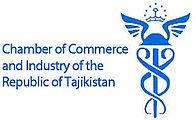

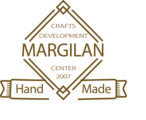

Downloads
- Pressemitteilung (PDF)
- Press Release (PDF)
- Abbildung: Vorbereitung Ikatkette, Yodgorlik Silk factory in Margilan, Usbekistan. Foto: Nadja Zdravkova, EU-SWITCH Projekt RUTSIS
- Abbildung: Ikatproduktion, Yodgorlik Silk factory in Margilan, Usbekistan. Foto: Nadja Zdravkova, EU-SWITCH Projekt RUTSIS
- Abbildung: Projektteam RUTSIS, vlnr: Laura Linsig, Kristin Nebauer, Prof. Bettina Göttke-Krogmann, Johanna Rogalla, Foto: Hochschulpressestelle, EU-SWITCH Projekt RUTSIS
- Abbildung: Ikatproduktion, Yodgorlik Silk factory in Margilan, Usbekistan, Foto: Nadja Zdravkova, EU-SWITCH Projekt RUTSIS
- Abbildung: Ikatmalermeister, Foto: Nadja Zdravkova, EU-SWITCH Projekt RUTSIS
- Abbildung: Yodgorlik Silk factory in Margilan, Usbekistan. Foto: Nadja Zdravkova, EU-SWITCH Projekt RUTSIS
- Abbildung: Hof des Crafts Development Center Margilan, Usbekistan. Foto: Nadja Zdravkova, EU-SWITCH Projekt RUTSIS







